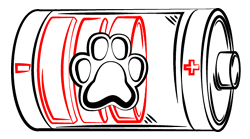
Paws ‘N’ Pups Quickview
Size
| Energy Level
| Trainability
| Paws ‘N’ Pups Rank
|
Characteristics
| Physical Characteristics: Height: 15-30” Weight: 55-100 lbs. Energy Level: Moderate | Colors: The Mastidoodle is found in the following colors:
|
Health & Longevity
Average Life Span: 10-15 years
Large and laidback, the Mastidoodle is a sweet cross between a Mastiff and a Poodle. The Poodle, while notorious for having several health problems later in life, rarely passes those health issues down to the Mastidoodle. Instead, most of these crossbreed canines take after the Mastiff health-wise. Mastidoodles are generally very healthy and happy, but they can develop one or two minor health setbacks around 5-6 years old, which is their version of middle age.
Kidney Stones – While rare, kidney stones are more prominent in Mastidoodles because, thanks to the Poodle genetics, their urine is more acidic. This acidity causes a build-up of mineral salts in the kidneys, bladder, or urinary tracts. These salts harden into literal rocks that can irritate, and even tear, the soft internal tissues. Symptoms include vomiting, blood in urine, UTIs (urinary tract infections), frequent urination, urine leaks after peeing, and yelping during urination. Most of the time, vets can prescribe medications to break up the stones. Other times, in severe cases, surgical intervention is required.
Joint Dysplasia – Occurring most often in the hips and elbows, this condition is usually categorized as a birth defect. It occurs when the joints develop incorrectly, causing them to slide in and out of the socket. Over time, this results in painful arthritis, cartilage deterioration, and a permanent, serious limp. Mastidoodles with joint dysplasia require surgeries to correct the condition. Symptoms are subtle and often go unnoticed, but regular vet visits can help vets keep up with the overall physical health of your pup throughout their lifetime.
Bloat – This condition can turn serious very quickly. If your Mastidoodle has a swollen, distended belly, weak pulse, labored breathing, or excessive drool, take him to the vet immediately. Often known as twisted stomach, this condition occurs when gas and stomach fluids become trapped in the abdomen. Your vet will relieve the pressure with non-invasive measures, then prescribe medication to keep bloat at a minimum. Severe, life-threatening cases require immediate surgery.
Despite a few minor and major health issues, the Mastidoodle is a healthy, happy crossbreed with strong genetics. These pups have a long lifespan between 10 to 15 years, but there have been a few noted cases where a Mastidoodle has lived upwards of 20 years.
Temperament & Train-ability
Mastiffs are notable for being gentle giants, while Poodles are sweet with a stubborn streak. Both of these parent breeds combined make a loyal, protective, kind pup. Often described as the equivalent of the Nanny dog from Peter Pan, the Mastidoodle is an affectionate, intelligent pup with a big heart and loving disposition.
He loves to be pet and shown affection by his family, but he may be cautious and hesitant around strangers. Introduce new people to your Mastidoodle to show him there is no danger. After an introduction, these big sweethearts easily accept the kind attention of other people.
Mastidoodles have a shy, sensitive nature about them. They are receptive to positive, compassionate attention, but their feelings are hurt very easily. Choose your tone carefully when interacting with these crossbreed pups. Yelling or negative attention could result your dog being afraid of you.
The Mastidoodle is a fairly active, energetic pup that requires regular exercise. Take him on a couple of long walks, allow him to frolic in a dog park with other pups, or let him go in your fenced-in backyard. When indoors, invest in a few chew toys and tug ropes to keep him happy and healthy, even on rainy days. Apartment living is fine for a Mastidoodle as long as he has enough space to comfortably lay down and move around. He needs outdoor time every single day, so be sure to make time in your schedule for walks or ask a trusted friend to help with your pup’s daily exercise.
Most of the time, training a Mastidoodle is easy. While their Poodle genetics suggest a stubborn streak, their Mastiff genes override that with a calm, even temper. The only downside to training a Mastidoodle is holding their attention. If you repeat the same command over and over again, he may get bored and saunter off to do other things. Hold his attention with the promise of treats and praise for when he complies with your instructions.
Grooming
Poodles have curly, thick fur, but Mastiffs boast coarse, short hairs. Mastidoodles have a combination of the two coats, resulting in wavy hair that can grow quite long. If you have a problem with his fur length, ask a professional groomer to give him a trim every once in a while. Otherwise, brush your Mastidoodle twice a week with a firm-bristled brush. He sheds considerably in the summer months, so brush him more frequently during this time to eliminate excess hair and dander.
Bathe your Mastidoodle when you think he needs it. No more than twice a month. And trim his nails bi-weekly or use a file to shave them down if you’re afraid of nipping them.
Diet
Because of their large size, Mastidoodles need a bit more food than the average dog to remain healthy and happy. Feed your pup 4-5 cups of dry, high-quality kibble, split into two meals per day. Since he is prone to skin allergies, ask your vet which nutritious brand they would recommend for your dog. He needs plenty of fiber and protein to keep his body and mind operating at optimal, healthy levels.
Looking for a Mastidoodle?
 Find A Mastidoodle Breeder |  Mastidoodle Puppies For Sale |  Adopt A Mastidoodle |
Cost
Before you go to a breeder, check your local shelter for a Mastidoodle. You could give a beautiful pup the second chance he needs for a great fur-ever home. Adoption fees run between $250 to $300, depending on the age and health of the Mastidoodle. You should also consider extra expenses, like vet visits, vaccinations, flea treatments, micro-chipping, food, and toys.
If you go to a breeder, expect to pay upwards of $650 for a Mastidoodle puppy. Adult Mastidoodles cost between $300 to $450 from a reputable breeder.
Paws ‘N’ Pups Ranking
Paws ‘N’ Pups ranks every breed out of 4 with 1 being easiest to integrate into your life and 4 being the toughest – The lower the ranking the better.
Ranking takes into account a few basic factors including cost, skill level needed, high vs low maintenance and how critical regular training is to success. Due to their size, a Mastidoodle ranks a 2 on the integration scale. They are gentle giants of the crossbreed category, but they do require a great deal of food, which can be quite expensive. Make sure you are absolutely, 100% committed to giving this pup a great home before you decide to bring a Mastidoodle home. This dog, and all dogs for that matter, are at least a decade-long responsibility.
Breeds Similar To Mastidoodle
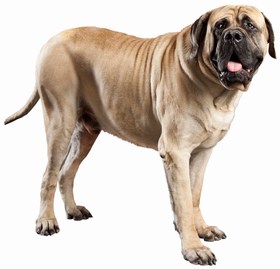 Mastiff | 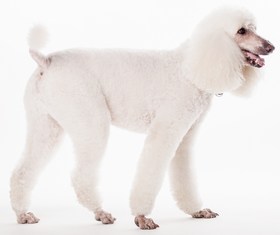 Poodle | 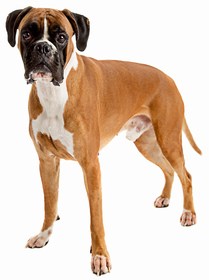 Boxer | 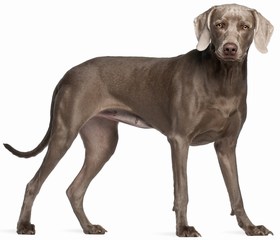 Weimaraner |


